In my Renegades series, two sides are pitted against each other: the Renegades, a powerful syndicate of superheroes who rule over Gatlon City, and the Anarchists, the supervillains who were overthrown ten years ago and who still yearn to dispose of the Renegades and return to their seat of power. The story focuses on Nova, who has cause to despise the Renegades and is determined to destroy them at any cost… and Adrian, who is convinced that one of the Anarchists is responsible for the murder of his mother.
It’s classic hero against villain. Good against evil.
Or is it?
Sometimes, the lines between right and wrong are blurred. Sometimes we do the wrong things for the right reasons. And sometimes even the best of intentions go awry.
Which means, for us readers, it isn’t always clear which side we’re supposed to be rooting for.
Here are five of my favorite books that test our loyalties at every turn.
Three Dark Crowns by Kendare Blake
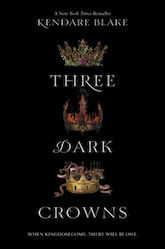 This book took the young adult fantasy genre by storm when it pitted triplet sisters, each raised separately on the island queendom of Fennbirn, against each other in a deadly battle to see who will become the next queen. In the opening chapters, it might seem obvious which sister is meant to be the victor, but as we’re given glimpses into each of their minds, strengths, and histories, the answer becomes increasingly more difficult to detect. By the end of this book, I was left entirely blindsided, with no clue which direction the story might go, who I hoped would win the crown, and which of the sisters, if any, would ultimately survive. Kendare Blake’s ability to build up the conflict and the constant twists and turns makes for a breathtaking read.
This book took the young adult fantasy genre by storm when it pitted triplet sisters, each raised separately on the island queendom of Fennbirn, against each other in a deadly battle to see who will become the next queen. In the opening chapters, it might seem obvious which sister is meant to be the victor, but as we’re given glimpses into each of their minds, strengths, and histories, the answer becomes increasingly more difficult to detect. By the end of this book, I was left entirely blindsided, with no clue which direction the story might go, who I hoped would win the crown, and which of the sisters, if any, would ultimately survive. Kendare Blake’s ability to build up the conflict and the constant twists and turns makes for a breathtaking read.
Legend by Marie Lu
 In a futuristic version of the United States called The Republic, Day is the country’s most wanted criminal, while June is an elite military prodigy. When June’s older brother is killed and Day becomes the prime suspect, June makes it her mission to hunt him down. What follows is a battle of wits as Day and June attempt to stay one step ahead of each other… until they begin to uncover a series of lies and secrets that could suggest their goals aren’t so different after all. Legend is a thrilling page turner, but what sets it apart in the world of dystopians is the amount of heart and humanity Marie Lu brings to all her characters, and the ways in which Day and June are ultimately able to bridge the gap between distrust and empathy, despite the mounting struggles between them.
In a futuristic version of the United States called The Republic, Day is the country’s most wanted criminal, while June is an elite military prodigy. When June’s older brother is killed and Day becomes the prime suspect, June makes it her mission to hunt him down. What follows is a battle of wits as Day and June attempt to stay one step ahead of each other… until they begin to uncover a series of lies and secrets that could suggest their goals aren’t so different after all. Legend is a thrilling page turner, but what sets it apart in the world of dystopians is the amount of heart and humanity Marie Lu brings to all her characters, and the ways in which Day and June are ultimately able to bridge the gap between distrust and empathy, despite the mounting struggles between them.
The Winner’s Curse Marie Rutkoski
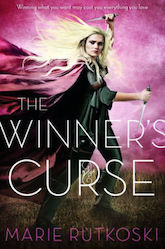 The country of Herran has been in turmoil since it was conquered by the Valorian Empire ten years ago. The citizenry have become enslaved to a new ruling class. Kestrel is the daughter of one of those conquerors—the highly respected General Trajan who played a vital role in winning the war. When she stumbles onto a slave auction, she finds herself drawn to the slave Arin, whose defiance and inner strength mirror her own. Their lives become increasingly entangled, with Arin keeping dangerous secrets and Kestrel constantly pushing against the boundaries of society. What might seem like a simple story of the underdogs seeking to rise up against their oppressors is anything but. Marie Rutkoski deftly weaves the motives of all the players into a deliciously nuanced tale, full of complicated politics and power plays, mind games and strategies, a budding revolution and shattered loyalties. This epic series keeps us guessing to the end.
The country of Herran has been in turmoil since it was conquered by the Valorian Empire ten years ago. The citizenry have become enslaved to a new ruling class. Kestrel is the daughter of one of those conquerors—the highly respected General Trajan who played a vital role in winning the war. When she stumbles onto a slave auction, she finds herself drawn to the slave Arin, whose defiance and inner strength mirror her own. Their lives become increasingly entangled, with Arin keeping dangerous secrets and Kestrel constantly pushing against the boundaries of society. What might seem like a simple story of the underdogs seeking to rise up against their oppressors is anything but. Marie Rutkoski deftly weaves the motives of all the players into a deliciously nuanced tale, full of complicated politics and power plays, mind games and strategies, a budding revolution and shattered loyalties. This epic series keeps us guessing to the end.
Boxers & Saints by Gene Luen Yang
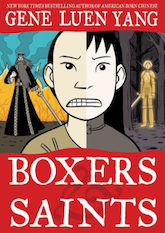 This groundbreaking graphic novel duology tells the dramatic story of the Boxer Rebellion that took place near the end of the Qing Dynasty in China. One volume is told from the point of view of Little Bao, a peasant boy whose village is attacked by Western “missionaries.” Inspired by visions of Chinese Gods, he ultimately joins the uprising against their infiltrators. However, the second volume tells the story from the perspective of a Chinese girl who has been taken in by those missionaries and finds in them a home and a family. Both sides of the conflict bring difficult questions of cultural identity, personal beliefs, and heart-wrenching choices, and the way in which Gene Luen Yang manages to balance the parallel storylines is nothing short of brilliant.
This groundbreaking graphic novel duology tells the dramatic story of the Boxer Rebellion that took place near the end of the Qing Dynasty in China. One volume is told from the point of view of Little Bao, a peasant boy whose village is attacked by Western “missionaries.” Inspired by visions of Chinese Gods, he ultimately joins the uprising against their infiltrators. However, the second volume tells the story from the perspective of a Chinese girl who has been taken in by those missionaries and finds in them a home and a family. Both sides of the conflict bring difficult questions of cultural identity, personal beliefs, and heart-wrenching choices, and the way in which Gene Luen Yang manages to balance the parallel storylines is nothing short of brilliant.
Daughter of Smoke and Bone by Laini Taylor
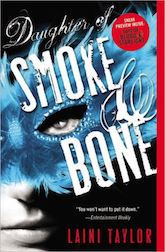 On the surface, Laini Taylor’s stunning fantasy might appear like a classic story of angels and demons, and who doesn’t know who wins that fight? But it doesn’t take long for this book to turn those archetypes on their heads. The story places blue-haired Karou, raised by teeth-collecting monsters in modern-day Prague, in the center of a centuries-old war that has been waged by the forces of good and evil. But nothing is as simple as it seems, particularly as Taylor weaves together a history full of prejudice, massacres, and an indestructible star-crossed love through the narrative. Between lush worldbuilding and Taylor’s signature poetic writing, this is a fantasy that tugs at every heartstring.
On the surface, Laini Taylor’s stunning fantasy might appear like a classic story of angels and demons, and who doesn’t know who wins that fight? But it doesn’t take long for this book to turn those archetypes on their heads. The story places blue-haired Karou, raised by teeth-collecting monsters in modern-day Prague, in the center of a centuries-old war that has been waged by the forces of good and evil. But nothing is as simple as it seems, particularly as Taylor weaves together a history full of prejudice, massacres, and an indestructible star-crossed love through the narrative. Between lush worldbuilding and Taylor’s signature poetic writing, this is a fantasy that tugs at every heartstring.
 Marissa Meyer’s first book in the Lunar Chronicles, Cinder, debuted on the New York Times bestseller list. Marissa lives in Tacoma, Washington, with her husband and their three cats. Archenemies, book two in the super-powered Renegades trilogy, is available now from Feiwel & Friends.
Marissa Meyer’s first book in the Lunar Chronicles, Cinder, debuted on the New York Times bestseller list. Marissa lives in Tacoma, Washington, with her husband and their three cats. Archenemies, book two in the super-powered Renegades trilogy, is available now from Feiwel & Friends.










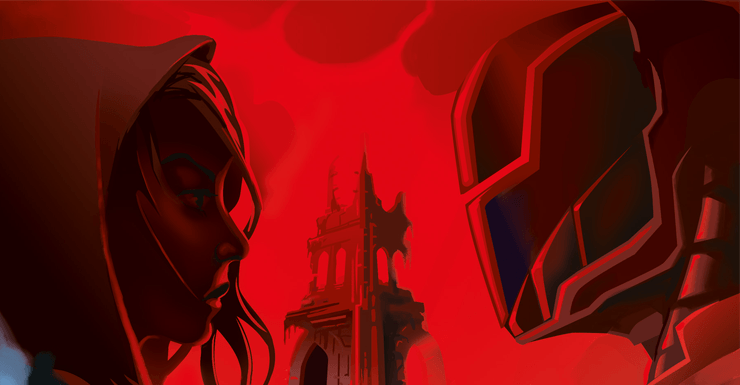
I love Marissa Meyers’ Lunar Chronicles, and I have read Renegades and am eagerly awaiting my Archenemies read, because it’s sitting on my desk. I’ll have to check out some of these, though Marie Lu is already on my watchlist always :-)
If a book asks me to decide which side, if any, to root for then my answer is going to be “nobody” and toss it into a trashcan and go read something better; by someone who knows how to write. This fine people on both sides carp, and the all sides have something to answer for carp, is something I don’t put up with in real life, so I’m not going to put up with it in fiction either. Authors can learn to pick a lane, or GTFO.
Game of Thrones seems to be the obvious choice, if only because all the sides are horrible in their own way.
And honestly, I feel this way about a lot of the Star Wars Clone Wars novels ;) I know that the ones in CHARGE (on both sides) of the war are evil, but the rank and file on both sides have been utterly manipulated. And depending on the author you’re reading, the Jedi/Republic don’t cover themselves in glory, either.
How about the early books in Hobb’s Tawny Man series, with the Farseers being in conflict with the secretive and often persecuted Old Blood minority? One should be rooting for the Old Blood but many of them hold extremist views and take reprehensible actions in support of their ends.
Early in the Malazan books, you’re invited into a variety of POVs that are seemingly at odds with one another, which allows you to align yourselves with many of the characters even when they’re working against one another.
One volume is told from the point of view of Little Bao, a peasant boy whose village is attacked by Western “missionaries.” Inspired by visions of Chinese Gods, he ultimately joins the uprising against their infiltrators.
Because that happened a lot. Those missionaries were always going round plundering villages and killing their inhabitants.
@6 ajay
https://en.wikipedia.org/wiki/Boxer_Rebellion#Causes_of_conflict_and_unrest
@6 ajay so you think the phrase “gunboat diplomacy” gained currency just because it sounds cool?
“Humans” by Donald Westlake. He’s best known for writing funny mysteries, but this is a stand-alone novel:
When God becomes angry with mankind and decides to end the Earth, he sends his chief angel down to gather a diverse group of humans to bring about the end of the world. Satan, who needs mankind’s sins in order to stay in business, sends his minions to save mankind. So as you can imagine, half-way through the book it gets hard to choose sides…
Gunboats crewed by missionaries, eh? Well well.
The Wiki has several cases of Chinese villagers murdering missionaries. It doesn’t seem to have many that happened the other way round.
But hey, when you have a highly nationalist conservative militia murdering members of a religious minority (Chinese Christians suffered very badly in the Rebellion) with tacit support from the government, there are often very fine people on both sides. Very fine people.
@2 random22
With respect, but I have often found the most effective stories are those where the author somehow gets me rooting for the wrong people altogether. One example is Mario Puzo’s The Godfather, but there are many others that could be named.
So my mileage varies from yours on this one :D
ajay @@@@@ 10:
But hey, when you have a highly nationalist conservative militia murdering members of a religious minority (Chinese Christians suffered very badly in the Rebellion) with tacit support from the government, there are often very fine people on both sides. Very fine people.
For what it’s worth, I found this in the NY Times review of Boxers and Saints:
And Gene Yang said this in an interview:
I think part of the problem is that Marissa Meyer’s “a peasant boy whose village is attacked by Western “missionaries”” might a slightly misleading description. This CBLDF page describes the inciting incident as
Any oldie but a goodie: Louise Cooper’s Time Master Trilogy.
I’d also like to nominate Guy Gavriel Kay’s _The Lions of al-Rassan_. Ironically it was comment 2 that first made me think of it.
The obvious parallels to real-world religions and history might “assign” some readers to a side, but ISTM that in that case there really are very fine people on both sides, which makes it all the more tragic that they’re fighting each other anyway.
@14 – I love that book so much.
Actually, there’s a climactic scene in Oathbringer that makes me feel the same way – the whole conflict is tragic and in fact one of the main characters has a complete heroic BSD over it and shuts down because he can’t pick a side.
IMO you overestimate Legend. The reader who pays attention will quickly realize that June’s side is vile and corrupt state (as the alert reader of The Demolished Man finds out very early that Ben Reich is not simply power-hungry but outright insane); I found the reveals predictable, even cliched.
You know those humans, if they are not destroying they are enslaving. We are the most destructive species on the planet.
It isn’t a book but 2 books that show a mere fraction of a long series: L. E. Modesitt’s Magic Engineer shows Dorrin’s view of the Spidlar fight and Colors of Chaos shows Cerryl’s view of the Spidlar fight. Absolutely outstanding writing.
Not quite on the theme, but close: Banks’s Consider Phlebas (a title which gives away some of the point). It’s a Culture novel from the viewpoint of a soldier for one of the Culture’s enemies; leaves you wondering just how good the Culture really is.
I’d also cite Elizabeth Willey’s A Sorcerer and a Gentleman; the character that should be the dashing leading man is morally ambiguous, and we see enough of the people he’s acting against to question who we want to come out ahead.